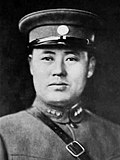| No. | Portrait | Name (Birth–Death) | Term of office | Important offices held during tenure | Premier | Ref. |
|---|
| Took office | Left office | Term |
|---|
| Minister of Water Resources of the Central People's Government |
|---|
| 1 |  | Fu Zuoyi
傅作义
(1895–1974) | 19 October 1949 | 28 September 1954 | 4 years, 344 days | Chairman of the Suiyuan Military and Political Committee
Commander of the PLA Suiyuan Military Region | Zhou Enlai | [4] |
|---|
| Minister of Water Resources of the People's Republic of China |
|---|
| 1 |  | Fu Zuoyi
傅作义
(1895–1974) | 28 September 1954 | 11 February 1958 | 3 years, 136 days | Vice Chairman of the National Defense Commission | Zhou Enlai | [4] |
|---|
| From 11 February 1958 to 23 February 1979, the post of Minister of Water Resources was abolished. |
| Minister of Water Resources of the People's Republic of China |
|---|
| 2 |  | Qian Zhengying
钱正英
(1923–2022) | 23 February 1979 | 8 March 1982 | 3 years, 13 days | Secretary of the Party Leadership Group of the Ministry of Water Resources | Hua Guofeng
↓
Zhao Ziyang | [5] |
|---|
| From 8 March 1982 to 9 April 1988, the post of Minister of Water Resources was abolished. |
| Minister of Water Resources of the People's Republic of China |
|---|
| 3 |  | Yang Zhenhuai
杨振怀
(1928–2024) | 9 April 1988 | 31 March 1993 | 4 years, 356 days | | Li Peng | |
|---|
| 4 |  | Niu Maosheng
钮茂生
(born 1939) | 31 March 1993 | 4 November 1998 | 5 years, 218 days | Secretary of the Party Leadership Group of the Ministry of Water Resources
Deputy Commander-in-Chief of the State Flood Control and Drought Relief Headquarters
Head of the State Council South-to-North Water Diversion Project Construction Committee | Li Peng
↓
Zhu Rongji | [6] |
|---|
| 5 |  | Wang Shucheng
汪恕诚
(born 1941) | 4 November 1998 | 27 April 2007 | 8 years, 174 days | Secretary of the Party Leadership Group of the Ministry of Water Resources
Deputy Commander-in-Chief of the State Flood Control and Drought Relief Headquarters | Zhu Rongji
↓
Wen Jiabao | [7] |
|---|
| 6 |  | Chen Lei
陈雷
(born 1954) | 27 April 2007 | 19 March 2018 | 10 years, 326 days | Secretary of the Party Leadership Group of the Ministry of Water Resources
Commander-in-Chief of the State Flood Control and Drought Relief Headquarters
Political Commissar of the People's Armed Police Force Hydropower Corps | Wen Jiabao
↓
Li Keqiang | [8] |
|---|
| 7 |  | E Jingping
鄂竟平
(born 1956) | 19 March 2018 | 28 February 2021 | 2 years, 346 days | Secretary of the Party Leadership Group of the Ministry of Water Resources
Commander-in-Chief of the State Flood Control and Drought Relief Headquarters | Li Keqiang | [9] |
|---|
| 8 |  | Li Guoying
李国英
(born 1963) | 28 February 2021 | Incumbent | 4 years, 255 days | Secretary of the Party Leadership Group of the Ministry of Water Resources
Commander-in-Chief of the State Flood Control and Drought Relief Headquarters | Li Keqiang
↓
Li Qiang | |
|---|








